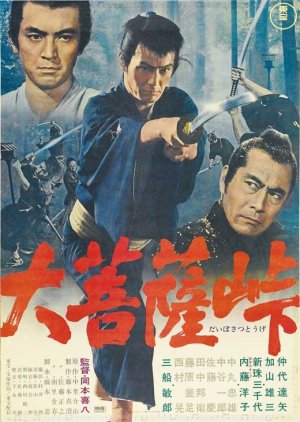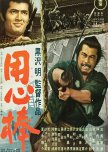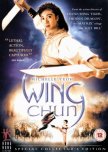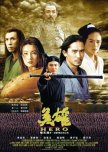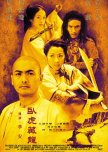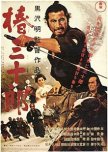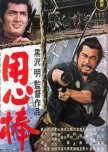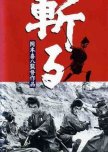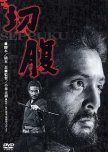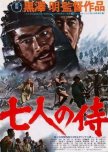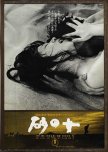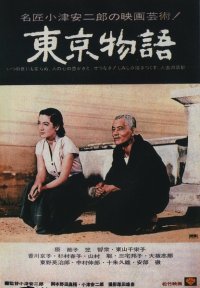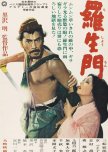
This review may contain spoilers
"The sword is the soul...Evil mind, evil sword."
The Sword of Doom opens up a flood gate of ethical and individual responsibility discussions when a samurai with his own code ran afoul of just about everyone else in the movie. Upon close examination, many of the characters deriding Ryunosuke for being a cold-blooded murderer should more closely have examined their own actions. But in the end, with the question of "Am I the jerk?", Ryunosuke should have spent more time on self-reflection.Near the end of the Shogunate different groups were vying for power. Seemingly apart from the political upheavals, a grandfather and granddaughter climb a mountain where there is a Buddhist shrine. As the grandfather is praying for death, Ryunosuke appears and cuts him down. A thief racing by him down the path eludes him and later finds the granddaughter weeping.
Ryunosuke was scheduled to spar with Utsuki Bunnojo. Hama, Utsuki's wife, comes and begs for him to allow her husband to win to save his and the family's reputation and to keep the leadership of the Kogen school intact. Ryunosuke tells her, "A swordsman prizes his skills like a woman prizes her chastity." If she is willing to set aside her pride, he will, too. When her husband finds out she slept with his opponent he hands her a letter of divorce and seeks blood. "This is no match. It's a duel!" proclaims one onlooker. When Utsuki uses a deadly illegal move, Ryunosuke ends the match permanently. Utsuki's clan ambushes him on the way out of town and he slices his way to freedom. Having nowhere else to turn Hama follows him.
After a time, Ryunosuke takes the name Yoshida and joins a group of ronin who help to prop up the Shogunate by assassinating anyone considered an enemy. Bunnojo's brother Hyoma trains at Shimada's school run by Mifune Toshiro. He wants revenge on his brother's death but knows his skills are not nearly good enough to defeat the deadly ronin. Along the way he meets the granddaughter, Omatsu, training at a flower school. The thief with a heart of gold, Shichibei, has cared for her since they met on the mountain.
Yoshida's unshakeable confidence is shaken along the way. That's what happens when you see Mifune Toshiro in action! His vacant gaze falters and fear creeps into his dark eyes. It is one thing to be a ruthless killing machine when you know no one can defeat you, it's quite another when you discover someone with superior skills. Up to this point he might have been able to explain his actions, but he begins to commit murders that cross the line and the invisible guilt cuts into his heart. Eventually, he comes face to face with the consequences of one of his actions and he completely snaps with the guilt manifested visibly.
On the mountain was he simply answering the old man's prayer to die or was he just in the mood to cut someone in half? Though Ryunosuke's actions were despicable when he made the deal with Hama, for him it was a business deal based on his own unflinching code. Completely outside of a normal ethical perspective but perfectly acceptable to him. He would blame her for Bunnojo's death unable to see that his lack of compassion and political foresight set his downfall into motion. No matter how angry and hurt Bunnojo was, he behaved dishonorably during the match and paid the price. His clan was in the wrong for ambushing a single man. At least according to the code of samurai movies, men died in duels all the time. The band of assassins he'd joined also showed that there was no honor among them. A man's character was revealed in and through his sword. Only Shimada fought to remain honorable throughout the film even as he guided Hyoma. Surprisingly, the thief Shichibei showed more honor than many of the samurai. As time went along, Ryunosuke's mental health deteriorated. Never one to show emotion, maniacal grins began to creep onto his face. The ghosts of murders past cried out to him sending him over the blood-soaked edge.
Ryunosuke was not a character you could like or even admire. Nakadai Tatsuya's performance was compelling as Ryunosuke's sanity shattered sending him down a path of no return. The sword fight choreography was better than average for the time, bloodier than average as well. There were a lot of misses but given the number of opponents dancing about that could be forgiven.
The framing and filming of the shots was beautifully done in black and white. The music also fit the mood. At two hours, it could feel long at times, but overall was engaging.
The Sword of Doom was perfectly titled. The blade not only signaled doom to his opponents but to Ryunosuke as well. The film had a Shaw Brothers type ending with a freeze frame during the action. Was it a cliffhanger for further storytelling in a future movie? Many characters still had story left to live. Yet this was probably a perfect ending for the swordsman who had suffered his final break when karma came calling. Not a perfect movie, but an entertaining and action filled samurai film that asked a person to look into their own soul as well as another's for "The sword is the soul. Study the soul to know the sword. Evil mind, evil sword."
5/4/23
Was this review helpful to you?

A paradoxical relationship
A painfully slow yet exceptionally captivating tale of a man who chooses to devote his life to evil and the madness that follows, The Sword of Doom is more often than not defined by its meticulously precise construction. Serving as the first part of an unfinished trilogy adapting the famously incomplete Great Bodhisattva Pass, The Sword of Doom was thrust upon Kihachi Okamoto by Toho, due to them being dissatisfied with his previous film. Here, Okamoto not only delivers a grand, sweeping epic crammed with beautiful shots and exceptional staging but also marks it out as an expression of rage, conditioning and stylish tension. Although I found the pacing glacially slow in comparison to his other works, it's Tatsuya Nakadai's stunning performance that incarnates perfectly the paradox at the heart of his character which makes for such engaging viewing that it wasn't a huge deal breaker for me. Clean yet brutal, The Sword of Doom makes for a remarkably vicious gesture of destructive essence, with unmistakable visual beauty inseparable from horror.Was this review helpful to you?

Story: They kept saying the guy was evil, but MOST of the things he did were shady, but not evil per se. He is asked to comprise his ideals as a samurai, doesn't work well in a group, and has distain for a woman that lowered herself to save her husband and hates him. If a movie is telling you one thing, but showing you another, it gets really really old really really quick. Was he Paladin Samurai? by no means.
Acting: The lead does well with seeming to be devoid of emotion, without being devoid of acting. There was no time when the immersion was broken by bad acting, and Mifune, who has a cameo part in this, does an excellent job.
The Ending.....what do we say about the ending....I was supposed to be part one of a trilogy that never got made. When it ended we thought the moving was buffering....it wasn't, it was just done.
This way though you can give it a happy ending...or not if you like.
Was this review helpful to you?

